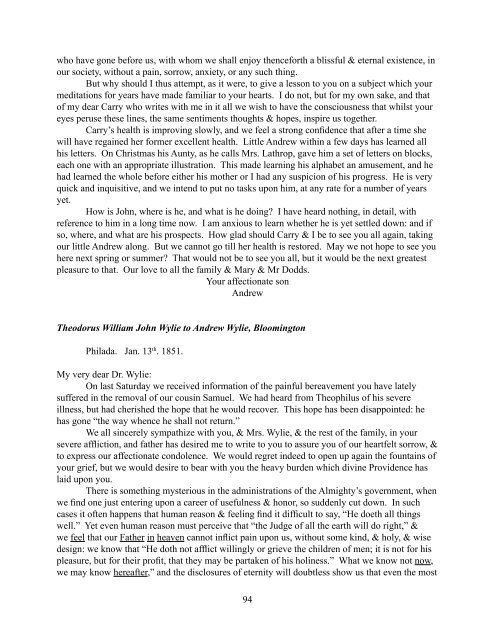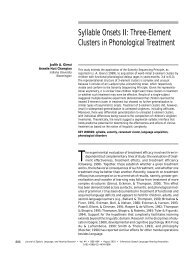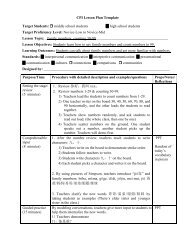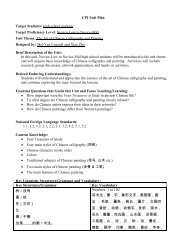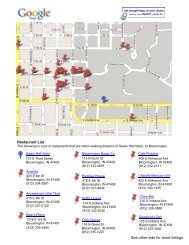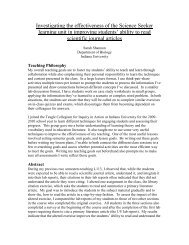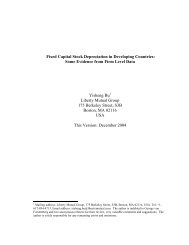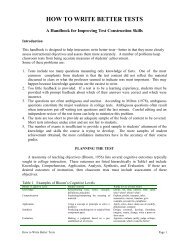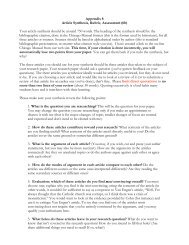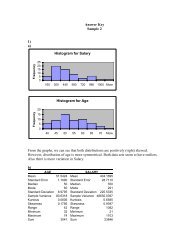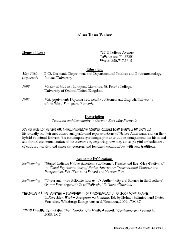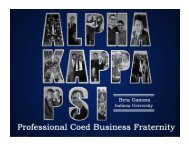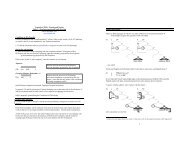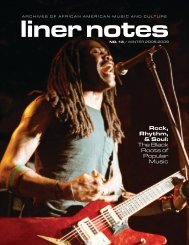The Andrew Wylie Family Letters - Indiana University Bloomington
The Andrew Wylie Family Letters - Indiana University Bloomington
The Andrew Wylie Family Letters - Indiana University Bloomington
Create successful ePaper yourself
Turn your PDF publications into a flip-book with our unique Google optimized e-Paper software.
who have gone before us, with whom we shall enjoy thenceforth a blissful & eternal existence, in<br />
our society, without a pain, sorrow, anxie ty, or any such thing.<br />
But why should I thus attempt, as it were, to give a lesson to you on a subject which your<br />
meditations for years have made familiar to your hearts. I do not, but for my own sake, and that<br />
of my dear Carry who writes with me in it all we wish to have the consciousness that whilst your<br />
eyes peruse these lines, the same sentiments thoughts & hopes, inspire us together.<br />
Carry’s health is improving slowly, and we feel a strong confidence that after a time she<br />
will have regained her former excellent health. Little <strong>Andrew</strong> within a few days has learned all<br />
his letters. On Christmas his Aunty, as he calls Mrs. Lathrop, gave him a set of letters on blocks,<br />
each one with an appropriate illustration. This made learning his alphabet an amusement, and he<br />
had learned the whole before either his mother or I had any suspicion of his progress. He is very<br />
quick and inquisitive, and we intend to put no tasks upon him, at any rate for a number of years<br />
yet.<br />
How is John, where is he, and what is he doing? I have heard nothing, in detail, with<br />
reference to him in a long time now. I am anxious to learn whether he is yet settled down: and if<br />
so, where, and what are his prospects. How glad should Carry & I be to see you all again, taking<br />
our little <strong>Andrew</strong> along. But we cannot go till her health is restored. May we not hope to see you<br />
here next spring or summer? That would not be to see you all, but it would be the next greatest<br />
pleasure to that. Our love to all the family & Mary & Mr Dodds.<br />
Your affectionate son<br />
<strong>Andrew</strong><br />
<strong>The</strong>odorus William John <strong>Wylie</strong> to <strong>Andrew</strong> <strong>Wylie</strong>, <strong>Bloomington</strong><br />
Philada. Jan. 13 th . 1851.<br />
My very dear Dr. <strong>Wylie</strong>:<br />
On last Saturday we received information of the painful bereavement you have lately<br />
suffered in the removal of our cousin Samuel. We had heard from <strong>The</strong>ophilus of his severe<br />
illness, but had cherished the hope that he would recover. This hope has been disappointed: he<br />
has gone “the way whence he shall not return.”<br />
We all sincerely sympathize with you, & Mrs. <strong>Wylie</strong>, & the rest of the family, in your<br />
severe affliction, and father has desired me to write to you to assure you of our heartfelt sorrow, &<br />
to express our affectionate condolence. We would regret indeed to open up again the fountains of<br />
your grief, but we would desire to bear with you the heavy burden which divine Providence has<br />
laid upon you.<br />
<strong>The</strong>re is something mysterious in the administrations of the Almighty’s government, when<br />
we find one just entering upon a career of usefulness & honor, so suddenly cut down. In such<br />
cases it often happens that human reason & feeling find it diffi cult to say, “He doeth all things<br />
well.” Yet even human reason must perceive that “the Judge of all the earth will do right,” &<br />
we feel that our Father in heaven cannot inflict pain upon us, without some kind, & holy, & wise<br />
design: we know that “He doth not afflict willingly or grieve the children of men; it is not for his<br />
pleasure, but for their profit, that they may be partaken of his holiness.” What we know not now,<br />
we may know hereafter,” and the disclosures of eternity will doubtless show us that even the most<br />
94<br />
painful events which have befallen us, have been for our benefit, that “all things do work together<br />
for good, to those who love God, and who are the called according to his purpose.”<br />
No doubt such afflictions are necessary for us. We need to learn more the divine<br />
Sovereignty, which it is so easy to admit in <strong>The</strong>ory, while, alas, perhaps we are often so reluctant<br />
to yield to it when it comes in collision with our own preferences. Yet God is God just so far as<br />
He is Sovereign, and we are really denying God, in so far as we deny his Sovereignty. He has a<br />
right to do, and he will, do what he pleases, while we rejoice that he never can do anything which<br />
is not just & good.<br />
<strong>The</strong>n, too, we need to be drawn off from the World. It is strange that we think of it so<br />
much, & cling to it so strongly, & trust in it for happiness so constantly, when in any instant we<br />
may be obliged to leave it, and when certainly the time must come sooner or later that it can do<br />
nothing for us. It’s inadequacy to supply what is necessary for our happiness is shown by such<br />
afflictions, and we are thus led to feel that “this is not our rest:” that our souls need something<br />
more & better than all the world could give us, something that the world can never take away<br />
from us.<br />
And besides all this what a tendency such bereavements have to draw our hearts towards<br />
heaven. In the consolatory belief that our departed friends or relatives have “gone to be with<br />
Christ,” “We may sorrow not as those who have no hope, since those who sleep in Jesus God will<br />
bring with Him at His coming.” Death is divested of much of its painfulness when we consider<br />
that it will reunite us to those whom we have dearly loved. Heaven possesses increased attractions<br />
when we regard it as the abode of those for whom we have had the strongest affection. We have<br />
more treasure in heaven, & our hearts will be more there also. <strong>The</strong> other worlds will seem more<br />
like home to us, than this does.<br />
But dear Dr. <strong>Wylie</strong>, I almost feel as if I should not send a letter which merely expresses<br />
thoughts which have been already much more clearly before your mind. Yet if any of us had been<br />
present with you, while we were mingling our tears with yours, we would have been naturally led<br />
to such reflections, and we know<br />
that we are directed to “comfort one another with such words.” At least you will accept of them as<br />
an expression of our sincere love & regard for you all.<br />
Please present our kindest sympathies to Mrs. W. & all the family.<br />
Hoping that He who is “the Father of mercies & the God of<br />
all comfort, may comfort you in all of your tribulation,”<br />
I am with great affection & esteem<br />
Truly yours,<br />
T. W. J. <strong>Wylie</strong><br />
Rev. Dr. <strong>Wylie</strong>.<br />
<strong>Bloomington</strong>. Ind.<br />
<strong>Andrew</strong> <strong>Wylie</strong> to John H. <strong>Wylie</strong>, Richmond, <strong>Indiana</strong><br />
Bloom.n 19 th Jan. 1851<br />
Dear Son:<br />
95


